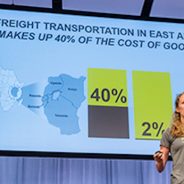Search results for :
Coolest MBA Student Clubs in London
Any student pursuing an MBA quickly learns that the process of earning the degree is so much more than just what happens in the classroom. From internships to competitions to networking events, what happens outside of the classroom can be crucial to an individual’s development in business.
Fortunately, most business schools offer a number of student organizations with a focus in business. Providing an opportunity to meet like-minded individuals and further one’s classroom experience, these student groups can be an integral part of earning an MBA.
If you are planning on or are pursuing your degree in the London metro, here are just a few of the coolest student groups available.
Imperial College Business School—Imperial College London
Sustainability in Business Club: The Sustainability in Business Club at Imperial College Business School aims to provide a platform for students to gather together around an interest and issues in business and sustainability. Students in the club have a range of interests within sustainable business, such as environmental and social sustainability, green energy and clean technology, legislation for sustainable business and/or mobilizing businesses for climate change. The club gives students the opportunity to learn the latest trends within the industry, draw connections from the business school curriculum to real-world questions of sustainability and showcase research from Imperial Business School students. The club pursues these goals through the use of on-campus events, excursions and even webinars to encourage dialogue and collaboration between club members and the broader business community.
Cass Business School—City University London
Cass Toastmasters: The Toastmasters club at Cass Business School is by no means new to the scene. Established in 1924, Toastmasters International has long been dedicated to helping students become better leaders through hands-on practice. Through the Toastmasters training, students will develop skills in listening and in offering constructive criticism, effective management and presentations, among others. Students practicing their leadership skills will benefit from immediate feedback and the chance to use that feedback to keep refining their abilities.
Cass Women in Business: Being a woman in the business world can be a unique experience, and groups like Cass Women in Business provide a space for women in the field to support each other along the way. The group aims to bring attention to gender differences within the business world, inviting both men and women together to discuss these issues and work toward building better and more effective teams. Cass Women in Business uses seminars, presentations, workshops and networking events to ignite dialogue and support talented women in the field.
London Business School
Business and Government Club: The Business and Government Club at London Business School aims to strengthen the link between business and government by supporting the professional development of each member and by staying up to date on trends and issues within the industry. The club also hopes to give students a chance to network both with club members and industry professionals. Club events include professional speakers, discussion nights and, this year, even a trip overseas to Washington D.C.
Emerging Markets Club: The Emerging Markets Club holds the goal of raising awareness for topics within the economy, politics, society and culture of emerging economies. The club hopes to create a platform to explore job opportunities within emerging markets, collaborating with regional clubs at LBS to demonstrate the unique experience of working within such fields. The club includes networking events with both alumni and current students, professional trips and speaker events.
Henley Business School—University of Reading
Henley Marketing Special Interest Group (SIG): The Henley Marketing SIG aims to provide a network for professionals within the sales and marketing field. The SIG is not just limited to current students but includes alumni and professional members of the industry, working together to create career opportunities and a space for sharing industry knowledge. The group uses presentations, workshops and networking opportunities to connect members and provides access to special discounts for professional resources.
Judge Business School—University of Cambridge
Social Innovation Club: The goal of the Social Innovation Student Interest Group at Judge Business School is to strengthen the community of social innovators at Cambridge. The group holds the belief that social innovation should be an integral aspect for all businesses, be they private, public or social.
Saïd Business School – University of Oxford
Oxford Entrepreneurs: The largest student society at Oxford University, Oxford Entrepreneurs is a massive collaboration between MBA students, alumni, undergraduates and external members. Now with more than 10,000 members globally, Oxford Entrepreneurs has become the largest free business and entrepreneurship society in the world. Supported by the Saïd Entrepreneurship Centre, the club hosts events such as the annual Oxford Inspires conference and Idea Idol.
DeGroote MBA Earns $30,000 Scholarship for Winning Video
Each year, the DeGroote School of Business at McMaster University holds the Adam Felesky MBA Scholarship Competition. This annual event takes place at the Ron Joyce Centre and offers newly admitted MBA students the opportunity to win a scholarship valued at $30,000. Continue reading…
Top NYC MBA Programs for Financial Assistance
Earning an MBA in New York isn’t cheap. Room and board alone can cost around $21,375 a year, and that’s on top of tuition. In fact, Columbia Business School recommends MBAs prepare for a total first-year budget of $104,712. With that number in mind, it’s no wonder that so many MBAs are concerned about financial assistance. Continue reading…
Alumni Spotlight: USC Marshall MBA Alumna Michele Tafoya
The career of one USC Marshall School of Business MBA alumna is a testament to the value of forming a strong base in communication.
Michele Tafoya (MBA ’91) is well known not only for her talents as one of NBC Sports’ leading newscasters, but also for her vibrant social media presence. Her undergrad degree in communications sparked her interest early on in using every possible outlet to share her voice.
UNT College of Business Establishes Endowed Chair with $1.5M Gift
The University of North Texas – College of Business was recently honored with a commitment of $1.5 million to establish an endowed position as chair to the Department of Accounting.
Top 5 San Francisco Startups
San Francisco’s current synonymy with startups could not exist without the city’s now mythological history as breeding ground for counterculture of the “tune in, drop out” variety—the antithesis of Silicon Valley, in many respects.
Continue reading…
Boston MBA Programs without GMAT and GRE Requirements
Let’s be honest: Nobody likes taking tests. And knowing that one test could have a significant impact on your education can make you feel like you’re in a pressure cooker. The GRE and GMAT are just two examples of tests that can leave talented, intelligent students waking up sweating. Continue reading…
Stanford Alum Talks Uber-Style App for Busy Families
Stanford’s Graduate School of Business recently published an article on its blog in which alumna Joanna McFarland (MBA ’05) offers an overview of HopSkipDrive, an “Uber-style” platform she co-founded with Carolyn Yashari Becher and Janelle McGlothlin to “match parents with drivers who shuttle their kids to and from school and activities.” Since it launched in November 2014 in Los Angeles, Farland’s service has arranged “tens of thousands of rides per month” for “busy families.” And families are busier than ever. Indeed, according to Pew Center research, 60 percent of American children live in families in which all parents work outside of the home.
Cambridge-Judge Correlates Successful Traders with Gut Feelings
Cambridge’s Judge Business School recently published an article on its blog about new research offering valuable insight into the role “gut feelings” (or interoceptive sensations, if you want to get technical) play in the success of financial traders, published as part of a Scientific Reports paper entitled “Interoceptive ability predicts survival on a London trading floor.”
University of the People: The Promises and Concerns of a Free MBA
As student loans rise and today’s business students struggle with the prospect of paying for their degree, the thought of a tuition-free MBA program may seem too good to be true. Nevertheless, last March the non-profit University of the People (UoPeople) opened applications for a tuition-free MBA, set to launch this month.
Run by Israeli entrepreneur Shai Reshef, University of the People would charge just $200 for each of the 12 courses student would be required to take as part of their MBA degree, a 15-month online program that would be available to 100 successful applicants. (In other words, tuition is free, but associated costs would be $2,400—still peanuts compared to most MBA programs.) For many qualified applicants who feel limited in their educational opportunities due to rising costs, the new UofPeople degree is cause for celebration. Many others, however, remain skeptical about what earning a tuition-free degree could mean in the long run.
Why You Should Be Skeptical
When considering whether or not to pursue a free MBA program, it makes perfect sense to be skeptical. How can there be such a significant difference in cost between MBA programs? How can it be possible that the quality is the same if the cost is so different?
The negligible price tag of the UofPeople degree has much to do with the fact that it will be offered online and very lightly staffed. And while instructors from top schools like INSEAD and Wharton will be largely behind curriculum development, they will not themselves be teaching the courses they help to build. Even Russell Winer, leader of the UoPeople MBA program and professor of marketing at NYU Stern, will not be teaching his own marketing course—and doesn’t know who will, according to an article in the Economist.
Perhaps this will change with the program’s official launch this month, but other concerns remain. For example, the online program lacks community, and as a result it lacks the opportunity for networking and forging connections that are a huge component of earning an advanced business degree.
Finally, UoPeople critics question how a tuition-free degree will be perceived by potential employers. Competition for top jobs can be fierce within the business community, and graduating with a degree from a recognizable MBA program can give applicants an edge. However, since UoPeople is not currently accredited by a global business-school agency, it cannot be considered for many rankings and may not be taken seriously by potential employers.
Why You Should Be Excited
While it’s understandable that degree seekers would approach UoPeople with doubt, there are also reasons to be excited about this program. This is a brand-new program, and any new program will take time to be widely recognized by employers. But more than 4,400 applicants from 161 countries have applied already, even though the university will only initially accept 100 students and gradually expand the program from there. Launched in 2009, UoPeople won accreditation for its undergraduate degrees in 2009 and now boasts more than 3,000 students. Of those interviewed, 60 percent said that their education had resulted in an increased salary or promotion opportunity.
Even though the university itself has been around longer than the MBA program, the school is still young, and early reactions to UoPeople have been promising. In April, UoPeople formed a partnership with the University of California, Berkeley, which announced it would accept top-performing graduates from UoPeople’s associate degree program to complete a bachelor’s degree at Berkeley. Such a partnership with a highly ranked university adds value and validation to a UoPeople degree.
Finally, a sustainable model of education is promising not just for UoPeople, but for the effects such an offering may have on other business schools and MBA programs. UoPeople founder Shai Reshef uses his model to anticipate a future in which the “majority of qualified people will have an opportunity for higher education.”
Overall, it is clear that there are still many questions about what a free MBA degree will mean for students and the business community. Nevertheless, the matter at the heart of UoPeople remains an important one: the ability for all qualified students to be able to pursue higher education, regardless of their means.
Quinlan Professor Ellen Landgraf Discusses Research on Local Government Fraud
Quinlan School of Business Professor Ellen Landgraf has been busy researching anti-fraud measures deployed by local governments, according to a recent article on the school website. The research highlights companies’ considerable fraud exposure and suggests that they can combat this problem by implementing established internal controls meant to detect and prevent fraud. This research will be published by the Journal of Forensic and Investigative Accounting.
Continue reading…
Business School to Break Into Tech?
Career changes are inevitable in this topsy-turvy economy, but how can business school graduates parlay their expertise into a lucrative and potentially high-impact career in the tech industry, which largely sources talent with more technical backgrounds?
10 Best LGBT-Friendly MBA Programs
It used to be that business school was for young straight white men, just as their older counterparts ran businesses. Thankfully, the reality has been changing for a while. Now, most top MBA programs welcome 30 percent women and almost 50 percent international students. Just as exciting, as the world has progressed, so, too, has LGBT equality in business school. Continue reading…
Top MBA Recruiters: Apple
Okay, let’s take a second to think about something: How many Apple products do you own? Macbook Pro, check; iPhone, check; Apple Watch, check; the list goes on and on.
Apple has created, produced and innovated such great products over the years that the company has really changed the face of the consumer electronics industry. The late Steve Jobs—a college dropout—gets a lot of the credit for Apple’s industry success, but there’s also a team of MBAs working for the Cupertino-based company, each making sure that the innovation doesn’t stop. Continue reading…
Columbia Talks Future of Free Trade in Op-Ed
Columbia Business School recently published an op-ed from Peter Wiegand about the potential future of free trade after the 2016 presidential election wraps this November.
MIT Sloan Showcases Student Startups
MIT Sloan recently published a list of 17 MIT startups to watch, based on presentations of ideas Sloan students developed in semi-secrecy this past summer as part of the recent MIT Delta V startup accelerator program. Continue reading…
Inside the MBA Rankings: A Guide to the Big Four Rankings
How do you choose the best MBA program for you? You check out the rankings of course! But, wait a second. Which ranking should you use?
A school ranked in the top 10 by The Economist might barely make the top 20 in the Financial Times and could rank in the top five by the U.S. News and World Report. So, which ranking is correct?
It’s not a matter of correctness. It’s a matter of what you value. Continue reading…
Starting a Career in Tech After Your MBA
When getting your MBA, it’s easy to get caught up in the herd mentality. With hoards of classmates heading off to meet with top consulting firms or pursuing careers in investment banking, it can be tempting to simply go with the flow. But while many business school students do choose careers in finance or consulting, those industries are not your only options.
Tech opportunities are exploding in a big way. In fact, 12 percent of MBAs accepted a job in the industry in 2015, according to the Graduate Management Admission Council’s (GMAC) annual Global Management Education Graduate Survey Report.
Why Is Tech Hot?
According to GMAC, 52 percent of tech companies plan to increase the number of MBAs they’ll hire in 2016. In fact, nine out of 10 technology companies will hire an MBA to fill positions in business development, marketing and sales, and more.
Beyond hiring, corporations like Facebook, Google and Apple have taken over their respective markets and built strong user bases that set them apart. According to Fortune, the tech giants Apple and Google are the most admired and valuable companies in the world.
Simply put, the technology sector is booming, and not since the dot-com era has it ever been a more attractive place to work.
Choosing a Career in Tech
According to Jeremy Schifeling, an MBA graduate out of the Ross School of Business and the founder of Breakinto.tech, there are only two things that really matter when choosing your career in tech post-MBA.
- The work that you’re doing.
- The environment that you’re doing it in (people + culture).
The Work
So, how do you choose a career in tech after your MBA? The key is to match up your roles and skills with their corresponding functions in tech. Schifeling breaks down five skills outside of the tech industry and how they translate into a tech job.
| Skills Outside Tech | Job Function in Tech |
| Strategy + Analysis | BizOps, Research, Analytics |
| Financial + Accounting | Finance, CorpDev |
| Built Products + Code | PM, Project, Operations |
| Persuasion + Influence | Marketing, Sales, BizDev |
| Built Teams + Culture | HR, Customer Success |
The Culture
Now that you know which tech job best fits your skills, it’s about finding the right organization for you. There are a few things to consider within the tech industry:
- The size of the company: Do you want to work for a corporate giant like Amazon or a small startup?
- Time at the office: Unlike many other industries, tech tends to be a little more flexible. It’s possible to get a tech job that lets you spend more time at home. Is that what you want or do you want to travel and spend your time in the office?
What MBA Skills Translate Best to Tech?
The reality is that most of the skills you’ll learn in your MBA will be crucial to the tech and startup industry, Adam Enbar (an MBA and co-founder and CEO of Flatiron School) told Quora. Nowadays, tech companies aren’t necessarily successful because of pure technological innovation. Instead, tech companies are successful because they’ve learned how to use existing technology in smart and innovative ways to meet the needs of their customers.
The reason MBAs are so valuable is because most graduates are business leaders who know how to spot opportunities to apply technology in new ways. MBAs also have the skills necessary to develop sales and marketing programs to help garner customers. Finally, MBAs have unique access to their schools’ networks and brands, which provides opportunities for funding, mentorship, future employees and more.
Best Tech-Focused MBA Programs
If you’re considering going into tech after your MBA, where should you go to school? CIO ranked the Top 10 Technology MBA Programs in America. We’ve briefly outlined that list below. And for even more guidance on best MBA programs for tech, don’t miss this Clear Admit article, “Tops for Tech: The Best Business Schools for a Career in Technology.”
- MIT Sloan School of Management: The school offers courses such as “Fundamentals of Digital Business Strategy” and “Generating Business Value in IT.”
- Carnegie Mellon Tepper School of Business: MBAs can earn an MBA with a specialization in technology leadership in tandem with a degree in computer science.
- UT Austin McCombs School of Business: Students can take advantage of an MBA concentration in information systems.
- University of Minnesota Carlson School of Management: The school offers a technology-focused MBA concentration.
- University of Arizona Eller College of Management: MBAs can choose the Management Information Systems (MIS) concentration.
- NYU Stern School of Business: Among the school’s many specializations is one in Management Information Technology and Operations.
- Stanford Graduate School of Business: The MBA program focuses on alternative education methods and offers an array of electives in operations, information and technology.
- University of Maryland Smith School of Business: MBA candidates can concentrate in information systems, operations management or business analytics.
- The Wharton School: The MBA program allows students to focus on operations and information management and specialize in systems.
- Arizona State University Carey School of Business: MBAs can concentrate in information systems.


















